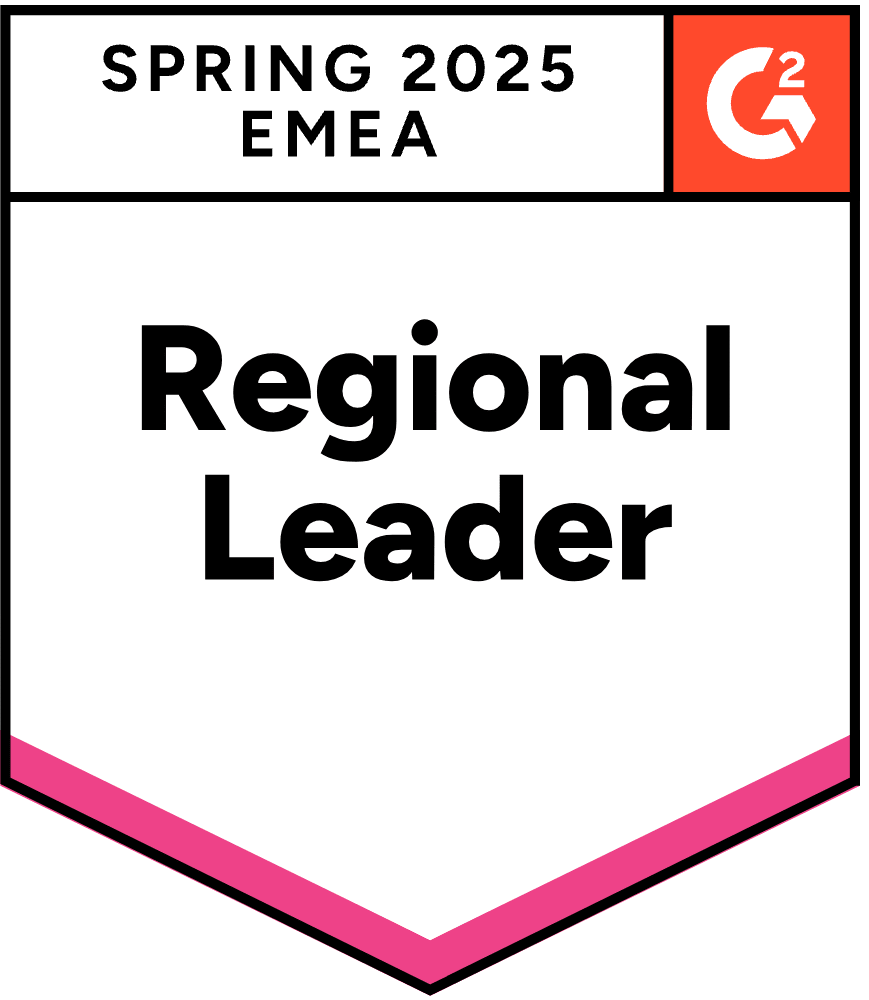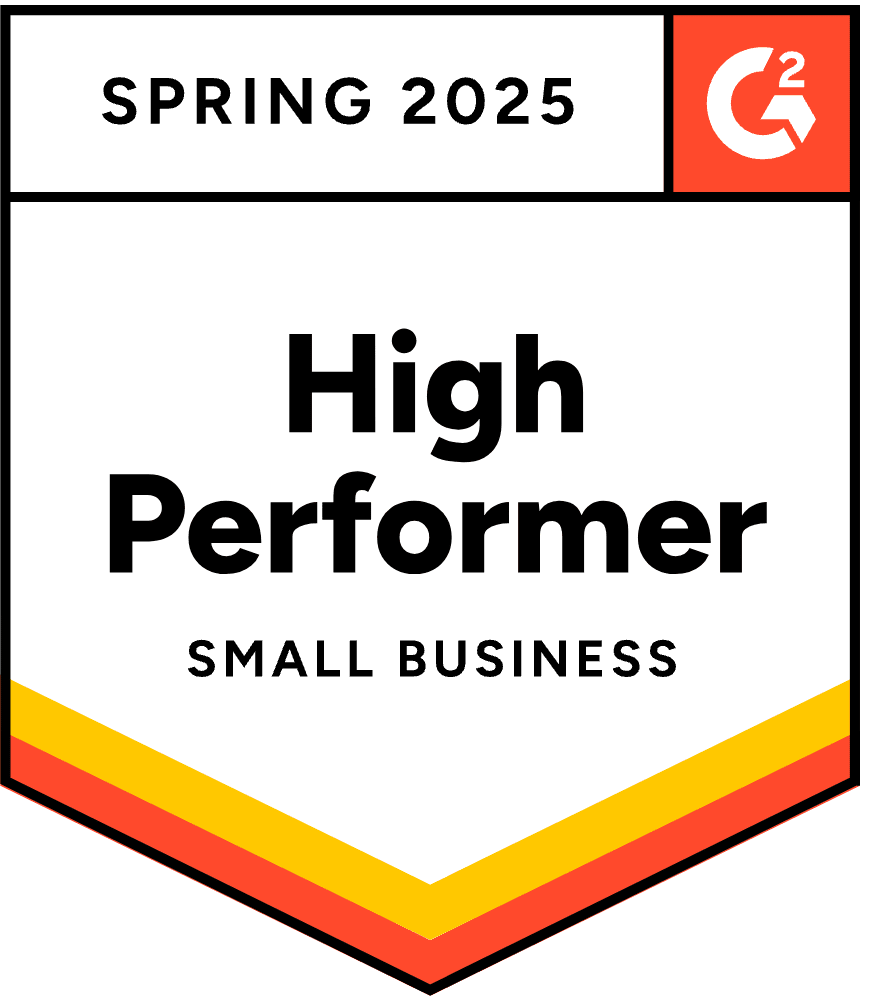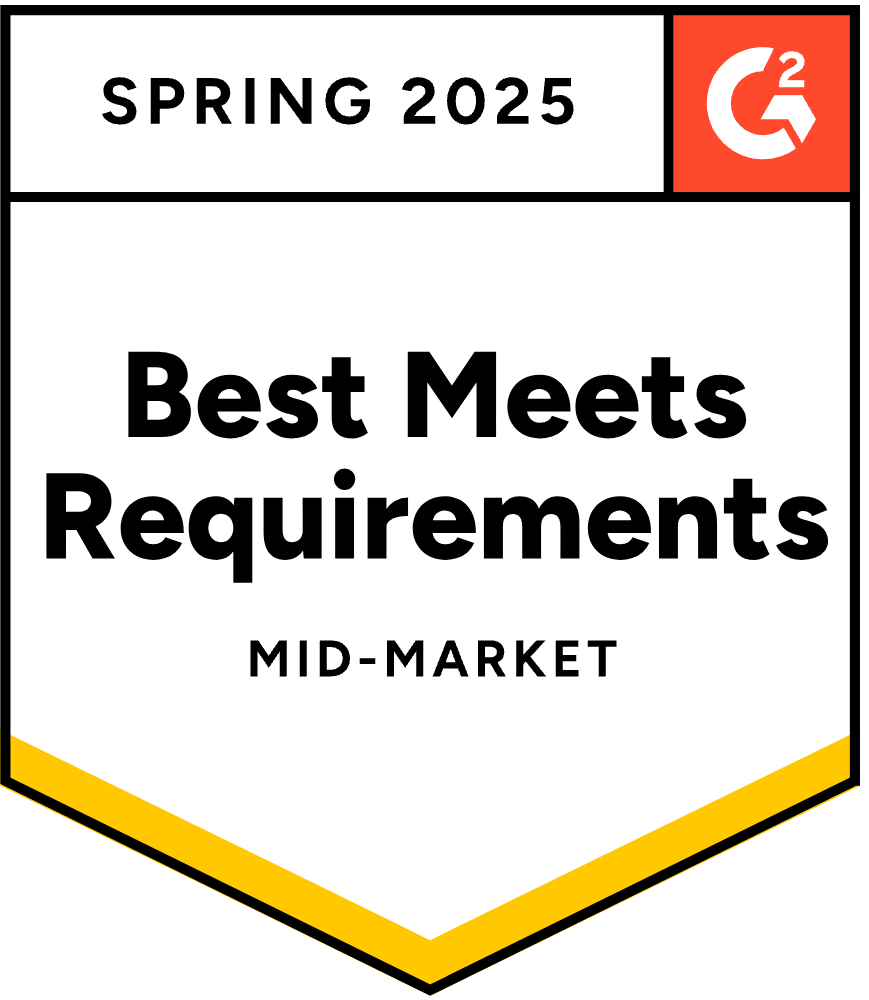- Blog
- Conversion Rate Optimization for Landing Pages: A Complete Guide for 2025
Conversion Rate Optimization for Landing Pages: A Complete Guide for 2025
-
Barbara Bartucz
- Marketing
- 6 min read
Table of Contents
Is your average landing page conversion rate falling short of your expectations? You’re not alone. Many businesses struggle to convert visitors into customers.
That’s why conversion optimization for landing pages is so crucial—you want to squeeze the most out of them!
But where do you start? What is a good landing page conversion rate? And why should you optimize those landing pages in the first place?
Those questions are about to be answered, so let’s roll!
What is a good landing page conversion rate?
The very first step of optimizing those landing page conversion rates is to know exactly what we consider to be a good conversion rate in different industries.
Here’s a quick industry benchmark breakdown:
- The average conversion rate across all industries is around 2.35%
- The top 25% of landing pages convert around 5.31% or higher
- The top 10% of landing pages convert at an astonishing 11%
- Ecommerce sites have an average conversion rate of around 2%
- B2B software companies have a higher average, of around 7%
- A conversion rate above 5% is considered strong
- Anything above 10% is stellar
Now, while a conversion rate above 5% is generally considered strong and anything above 10% is exceptional, it’s important to remember that these are just benchmarks. Conversion rates can vary widely depending on your industry, traffic source, and target audience.
This clearly shows us that a great landing page conversion rate depends on many things. But even with this variability, there are plenty of reasons to focus on improving your conversion rates.
Why should you optimize your landing pages?
Conversion rate optimization is an ongoing task that takes a lot of resources. You might be asking: why bother optimizing?
The answer is simple.
Optimizing your landing pages can bring incredible benefits that boost your bottom line. Let’s explore how a well-crafted landing page can transform your online presence.
1. Increased conversion rates
Optimizing landing pages involves refining page elements to encourage visitors to take the desired action, like purchasing or signing up.
If you constantly optimize your landing page, you’ll achieve the highest possible conversion rate.
2. Enhanced user experience
A seamless landing page experience (think fast loading times and mobile-friendliness) keeps site visitors engaged and focused on your message. This enhances the overall landing page experience and guides them towards conversion.
3. Improved trust and credibility
First impressions matter! High-converting landing pages project professionalism with a consistent brand image and persuasive copywriting. This builds trust with visitors, making them more likely to convert.
4. Better search traffic
Optimized landing pages can increase search traffic with strategic use of specific keywords and relevant content.
Optimizing for relevant keywords increases your landing page’s visibility in search engines, attracting more qualified leads who are actively searching for what you offer.
5. Support for ad campaigns
Want your ads to pack a punch? Get rid of irrelevant landing pages that confuse visitors who click your ads. Optimized pages provide a seamless user experience specifically designed to convert visitors.
6. Better ROI
Let’s talk about money, shall we? Landing page optimization can significantly lower your cost-per-click (CPC) and decrease overall customer acquisition costs (CAC).
This means you’ll spend less to acquire each customer, leading to a healthier return on investment (ROI) for your marketing efforts. Who doesn’t love a better ROI and more conversions?
7 landing page optimization strategies you should try out
We’ve discussed all the basics, and now it’s time to get down to action so you can revamp your marketing campaigns and boost your landing page conversion rate.
Here’s how to do it!
1. Audit your current landing page performance
Hold on! Before revamping your landing page, take a moment to check its current performance. Start your landing page optimization practices by analyzing your baseline, as this will be key to measuring success.
Become a landing page detective by analyzing user behavior with heat maps to identify attention-grabbing areas and friction points.
Witness the visitor journey firsthand through session recordings to uncover potential roadblocks hindering conversions.
Also, don’t be afraid to ask! Launch surveys to gather qualitative data on why visitors take (or don’t take) action, from both converting and non-converting visitors.
Analyze user feedback to pinpoint areas for improvement, from clarifying your message to streamlining your form or call-to-action (CTA).
By using these tools, you’ll gain a deeper understanding of how visitors interact with your landing page, equipping you to take the next step.
Here are some popup templates that you can use to ask for feedback from website visitors:
2. Optimize elements above the fold
We all know the power of first impressions, right? That’s true for your landing page, too.
Focus on optimizing the “above the fold” area for maximum impact.
Craft a headline that’s clear, concise, and instantly conveys the value you offer. Think of it as your landing page’s superhero, capturing attention and sparking interest.
Warby Parker’s headline is a great example of clearly communicating the value for the visitor:
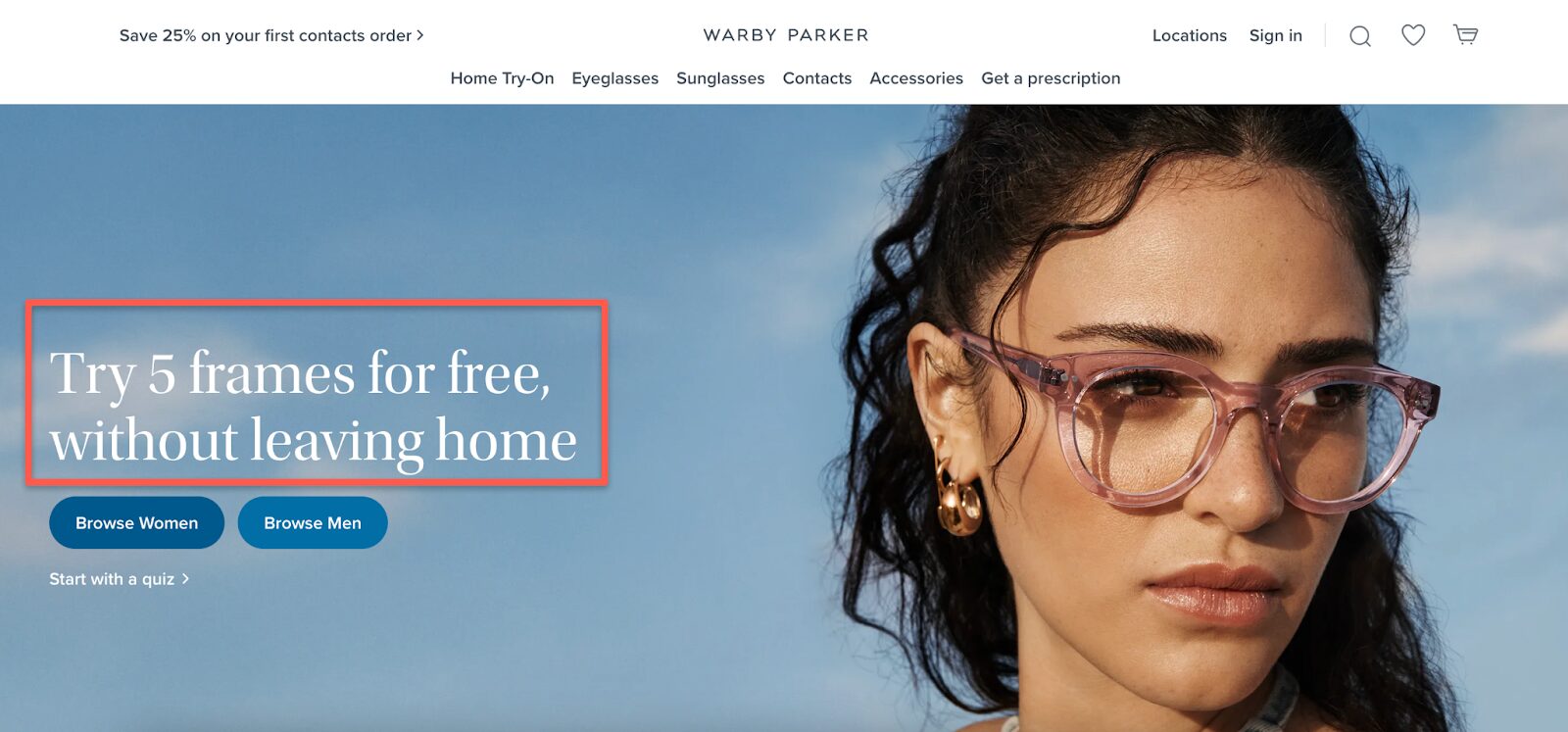
If you feel like you can’t communicate everything in a headline like Warby Parker did, you can position your value proposition powerhouse directly under the headline, highlighting the benefits that resonate with your target audience.
Don’t just tell them what you offer, tell them why they need it!
A high-converting landing page should include a strong call-to-action. Make sure it stands out visually, and use persuasive language so the visitor feels the urge to take action.
Last but not least, let’s mention forms, which can be a bottleneck when it comes to landing page conversion rates. Do your visitors often start filling yours and then stop?
This is a sign that your landing page form is way too long.
The easier it is to complete, the more likely you are to convert those valuable leads. A landing page form should be as short and simple as possible while collecting the information you need.
3. A/B test different value propositions
Ever found yourself staring at a blank page, desperately trying to craft the perfect value proposition that will turn visitors into paying customers?
You don’t need to rely on guesswork. By testing different messages, you can find valuable insights into what truly resonates with your target audience.
You’ll discover which headlines act as customer magnets, pulling them in and driving conversions through the roof.
Take Crown & Paw for example. They experimented with four different homepage headlines, and bam! Orders increased by 16%.
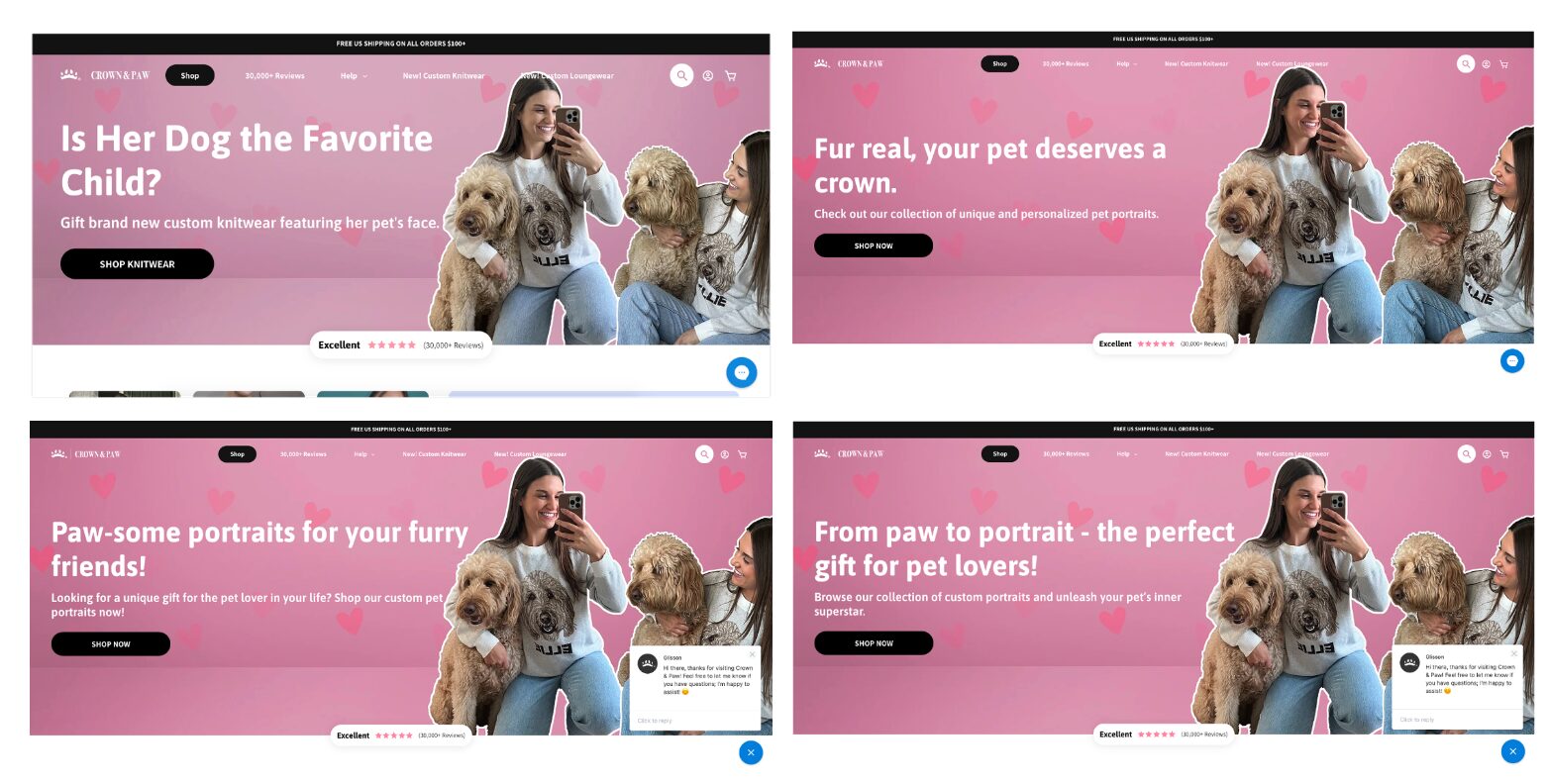
A perfectly optimized landing page doesn’t just come together: it requires testing different value propositions until you find the ONE that resonates with your target audience.
Find out how to do it with OptiMonk.
4. Match your landing page headline to your ad copy
Have you ever clicked on a Facebook or Instagram ad and then found very different messaging on the landing page? Then you know how off-putting that can feel!
This happens when you run multiple Facebook or Instagram ads with different messages and value propositions redirecting to the same generic landing page.
Here’s where personalization comes in: if you’re running multiple ads with different messages and value propositions, it’s crucial to personalize the landing page to match each ad.
You want to personalize your landing page copy and value proposition to match each ad’s specific message. This creates a seamless user experience that keeps visitors engaged and increases the likelihood of landing page conversions.
Remember, a confused visitor is a lost lead.
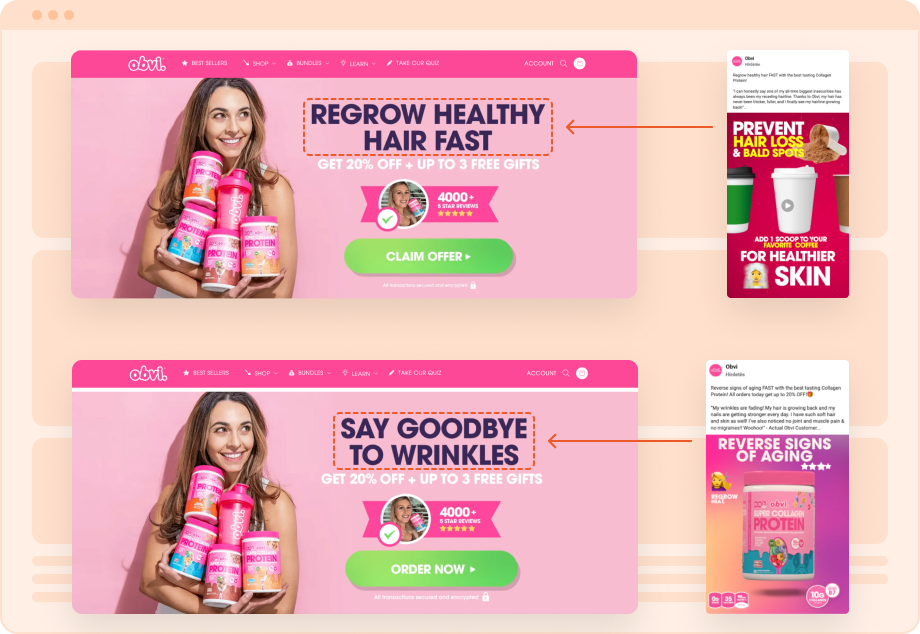
5. Add personal greetings for returning customers
Picture this: A visitor clicks on your email, eager to learn more. They land on a page that greets them with a warm “Hey Ryan, here’s your unique discount!” Suddenly, it’s not just a generic website, it’s an experience tailored just for them.
As a business, you probably collect your subscribers’ first names so you can personally greet them in emails. So why not improve your landing page experience by using their name there, too?
This simple act of personalization goes beyond a catchy headline. It fosters an emotional connection with your customers, making them feel valued and seen.
This emotional connection can be a powerful tool, leading to increased engagement and ultimately, higher landing page conversion rates.
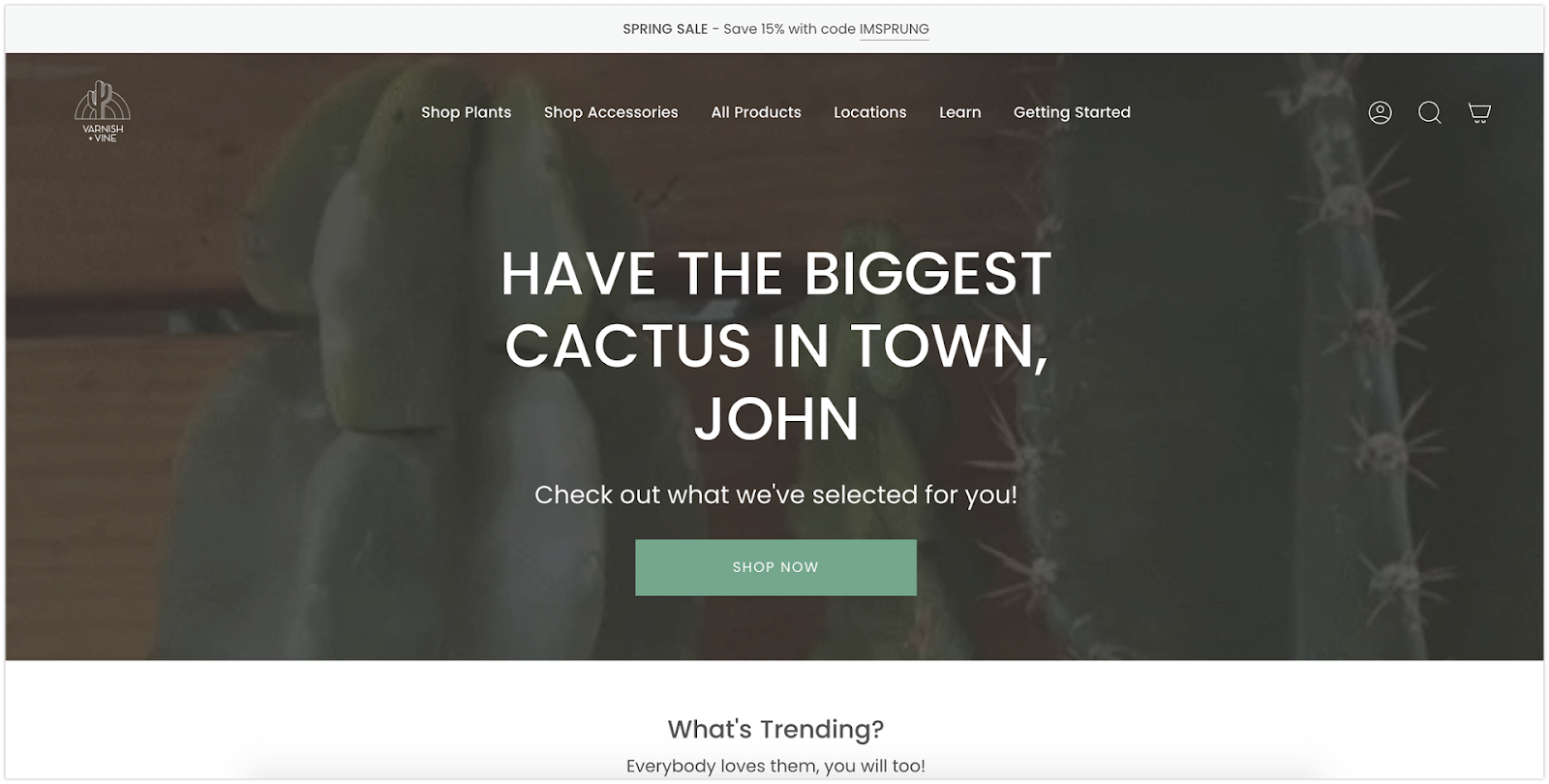
Start optimizing your landing pages and learn how to greet your visitors by name!
6. Use an exit popup
Even the most epic landing page won’t convert everyone. But before you throw in the towel on those departing visitors, consider using exit-intent popups.
These popups appear just as a visitor is about to leave your page, offering them a final chance to engage.
Instead of letting them disappear, use exit-intent popups to capture leads with enticing offers. This could be a discount code for their first purchase, access to a valuable e-book, or exclusive content related to your landing page’s message.
By providing something of value in exchange for their email address, you not only prevent them from becoming lost leads, but also nurture a potential customer relationship. It’s a real win-win!
7. Keep the layout simple and focused
High-converting landing pages are never messy.
When designing your landing page, remember that “less is more.” A clean, minimal layout allows visitors to focus on what truly matters: your call-to-action (CTA).
By keeping elements to a minimum and sticking to a single core concept, you eliminate distractions and guide visitors toward the action you desire—whether that’s signing up for your newsletter, downloading an e-book, or making a purchase.
Don’t overwhelm visitors with unnecessary information or visual clutter. A clear, concise landing page fosters a sense of trust and makes it easier for users to understand the value you offer.
This streamlined approach ultimately leads to higher conversion rates, turning casual visitors into engaged customers.
3 extra tips to maximize landing page optimization efforts
Don’t worry, our journey through these best practices continues with 3 extra tips to optimize landing pages.
1. Write landing page copy that gets results
The words on your landing page—your landing page message—can make or break your conversion rate. Instead of listing features, focus on how your product or service benefits customers in real life.
Here’s an example from AG1, where they clearly list their product’s benefits.
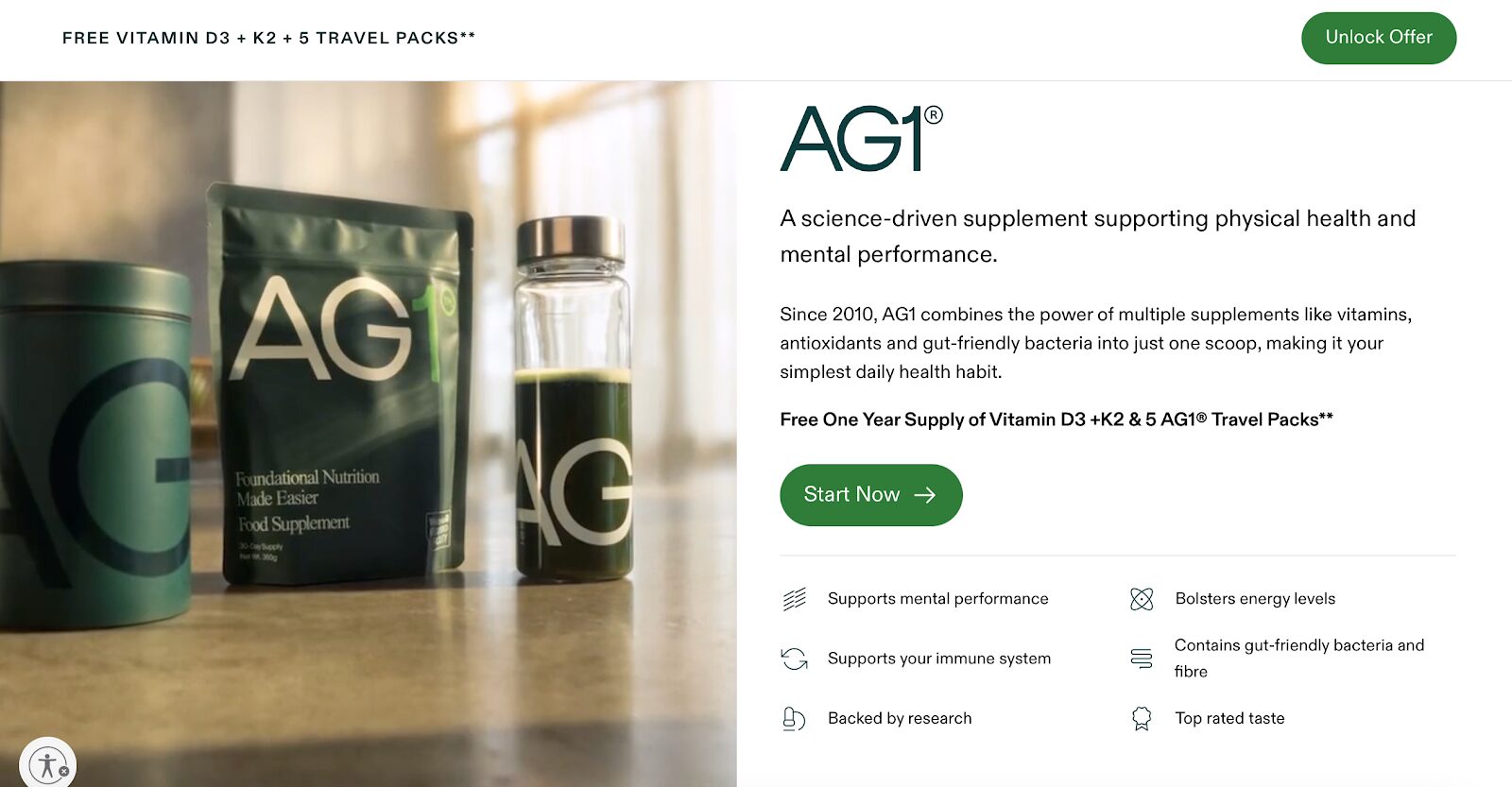
Explain how your product solves customers’ problems or makes their lives easier.
Use clear, concise language that’s easy to understand, and write in a friendly and conversational tone that builds trust and connection.
Don’t be afraid to ditch the jargon!
2. Choose the right color for your landing page
Never underestimate the power of color…
It can significantly impact how people perceive your landing page. Blue evokes trust and security, making it a great choice when you want to build credibility with visitors.
Green promotes feelings of nature and growth, perfect for promoting eco-friendly products or creating a calming atmosphere on your landing page. Red grabs attention and sparks urgency, so use it sparingly (it works well for calls-to-action).
Orange exudes warmth and excitement, ideal for promoting fun or adventurous offerings on your landing page.
Here’s an example from Judy, where they use orange as a dominant color in their landing page design.
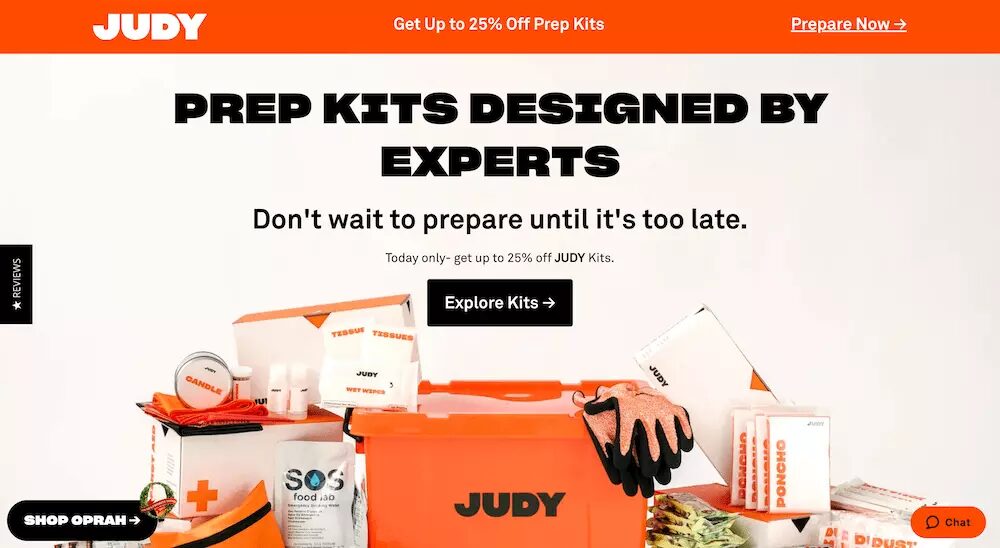
Remember, the best color choices depend on your brand, target audience, and overall message.
3. Optimize landing pages for mobile users
Did you know that more than half (54%) of website traffic comes from mobile devices?
That’s a good enough reason to optimize your landing page for mobile users! If you don’t provide a mobile-friendly landing page, you’re alienating a huge chunk of your potential customers. Plus, clunky mobile experiences lead to frustrated visitors bouncing away.
The good news? Responsive design (and good page speed) ensures that your landing page looks great and works flawlessly on all devices, boosting SEO for mobile searches and reaching a wider audience. This translates to more conversions and a happier you!
FAQ
How often should I test different landing page elements?
A/B testing is an ongoing process. It’s recommended to test different elements (headlines, CTAs, etc.) regularly and make data-driven decisions based on the results. Aim to test one element at a time to isolate the impact of each change.
What are some good tools for heatmap analysis and user session recordings?
There are several popular heatmap and session recording tools available, including Hotjar, Crazy Egg, and Microsoft Clarity. These tools provide valuable insights and visual data reports into user behavior on your landing page, helping you identify areas for improvement and track your landing page’s conversion rate.
How can I personalize my landing pages beyond using a visitor’s name?
Personalization can extend beyond names. Consider tailoring content based on user location, demographics, or previous website interactions. For example, if a visitor has viewed a specific product page, you could craft a targeted landing page that highlights related products or offers.
What if my landing page conversion rates are still low after optimization?
Don’t get discouraged! Landing page optimization is an ongoing process. Analyze your data closely to pinpoint potential problems. It could be an issue with your overall marketing strategy, website traffic source, or the value proposition itself.
Wrapping up
Landing page optimization is a journey, not a destination. With these insights in your pocket, you’re ready to create landing pages that captivate, convert, and catapult your business to new heights.
If you need a powerful ally to accompany you in your landing page optimization journey, OptiMonk is an unbeatable choice. Create your free account today and watch your conversion rates soar!
Migration has never been easier
We made switching a no-brainer with our free, white-glove onboarding service so you can get started in the blink of an eye.
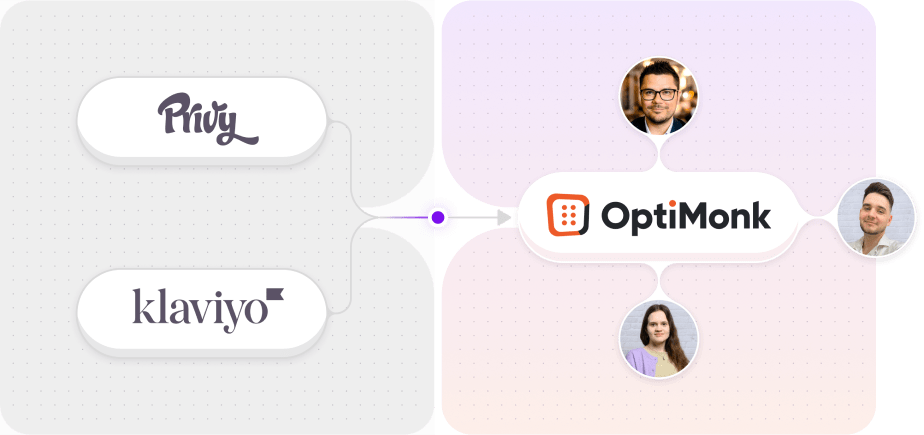
What should you do next?
Thanks for reading till the end. Here are 4 ways we can help you grow your business:
Boost conversions with proven use cases
Explore our Use Case Library, filled with actionable personalization examples and step-by-step guides to unlock your website's full potential. Check out Use Case Library
Create a free OptiMonk account
Create a free OptiMonk account and easily get started with popups and conversion rate optimization. Get OptiMonk free
Get advice from a CRO expert
Schedule a personalized discovery call with one of our experts to explore how OptiMonk can help you grow your business. Book a demo
Join our weekly newsletter
Real CRO insights & marketing tips. No fluff. Straight to your inbox. Subscribe now
Barbara Bartucz
- Posted in
- Marketing
Partner with us
- © OptiMonk. All rights reserved!
- Terms of Use
- Privacy Policy
- Cookie Policy
Product updates: January Release 2025
